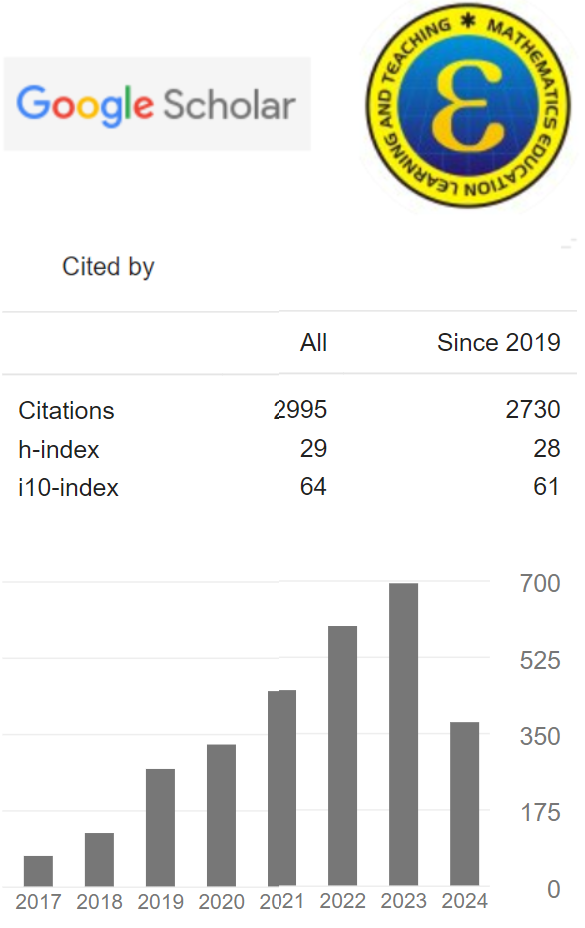Problem Based Learning (PBL) with Scaffolding Approach to Improve Students' Mathematical Literacy
(1) Universitas Negeri Semarang
(2) Universitas Negeri Semarang
(3) Universitas Negeri Semarang
(*) Corresponding Author
Abstract
Literacy skills are one of the skills needed by students to solve problems in real life. Therefore, it is necessary to conduct research in developing and improving students' mathematical literacy. The purpose of this research is to analyze the use of PBL with Scaffolding approach to improve students' mathematical literacy. This research method is a literature study, by taking 8 articles that discuss the application of PBL with a Scaffolding approach to improve students' mathematical literacy in Indonesia from 2018-2023. From the research results, the application of PBL with Scaffolding approach to improve students' mathematical literacy can be seen from the aspects of mathematical literacy, namely communication, mathematization, re-presenting, and reasoning and reasoning. Overall, PBL with a Scaffolding approach can improve mathematical literacy by obtaining an Effect Size value of 9.6701 in the large effect category and reinforced by the t-test calculation which found that  then  is rejected, which means that there is a significant difference between the average mathematical literacy of the experimental class and the control class
Keywords
Full Text:
PDFReferences
Agustin, T., Junarti, & Mayasari, N. (2022). Pengaruh Model Pbl (Problem Based Learning) Terhadap Kemampuan Literasi Matematika Pada Pokok Bahasan Statistik Siswa Kelas Xi Tkr Smkn 3 Bojonegoro. Journal Of Techonolgy Mathematics And Social Science) e-ISSN, 1(2), 2829–3363 Retrieved from https://ejurnal.ikippgribojonegoro.ac.id/index.php/JTHOMS/article/view/2519.
Anazifa, R. D., & Djukri, D. (2017). Project-based learning and problem-based learning: are they effective to improve student’s thinking skills? Jurnal Pendidikan IPA Indonesia, 6(2), 346–355. Retrieved from https://journal.unnes.ac.id/nju/index.php/jpii/article/view/11100/6809
Astuti, P. (2018). Kemampuan Literasi Matematika dan Kemampuan Berpikir Tingkat Tinggi. PRISMA, Prosiding Seminar Nasional Matematika, 1, 263–268 Retrieved from https://journal.unnes.ac.id/sju/index.php/prisma/article/view/19599.
Buyung, & Dwiyanto. (2017). Analisis Kemampuan Literasi Matematis melalui Pembelajaran Inkuiri dengan Strategi Scaffolding. Unnes Journal of Mathematics Education Research, 6(1), 112–119 Retrieved from https://journal.unnes.ac.id/sju/index.php/ujmer/article/view/18425.
Djidu, H., & Retnawati, H. (2018). Cultural values-integrated mathematical learning model to develop HOTS and character values. In E. Retnowati, A. Ghufron, Marzuki, Kasiyan, A. C. Pierawan, & Ashadi (Eds.),. Character Education for 21st Century Global Citizens, 363–370 Retrieved from https://www.taylorfrancis.com/books/9781351597340/chapters/10.1201/9781315104188-46.
Farhan, M., Satianingsih, R., & Yustitia, V. (2021). Problem Based Learning On Literacy Mathematics: Experimental Study in Elementary School. Journal of Medives : Journal of Mathematics Education IKIP Veteran Semarang, 5(1), 118. https://doi.org/10.31331/medivesveteran.v5i1.1492
Fazriah, R. S., Toto, & Nuraida, I. (2021). Peningkatan Kemampuan Literasi Matematis Siswa SMK melalui Model Group Investigation dengan Strategi Scaffolding. 2(3), 125–130. http://dx.doi.org/10.25157/j-kip.v2i3.6211
Istiandaru, A., Wardono, & Mulyono. (2014). PBL Pendekatan Realistik Saintifik dan Asesmen PISA untuk Meningkatkan Kemampuan Literasi Matematika. Unnes Journal of Mathematics Education Research, 3(2), 64–71. Retrieved from https://journal.unnes.ac.id/sju/index.php/ujmer/article/view/4620
Jauhariyyah, F. R. (2015). Pengaruh Pembelajaran Problem Based Learning dengan Scaffolding terhadap Kemampuan Analisis Siswa SMA Negeri 3 Lumajang. Universitas Negeri Malang. Retrieved form http://repository.um.ac.id/251440/
Lestari, I. S., Zaenuri, & Mulyono. (2022). Literasi Matematika Ditinjau Dari Self Efficacy dengan Menggunakan Problem Solving Learning Model dengan Strategi Scaffolding. Jurnal Inovasi Sekolah Dasar, 9(1), 27–35. https://doi.org/10.36706/jisd.v9i1.17091
Madyararti, D. Y., Wardono, & Prasetyo, A. P. B. (2019). Kemampuan Literasi Matematika Siswa pada Pembelajaran Problem Based Learning dengan Tinjauan Gaya Belajar. PRISMA 2, Prosiding Seminar Nasional Matematika, 2, 648–658. Retrieved from https://journal.unnes.ac.id/sju/index.php/prisma/article/view/29213
Muharomah, N. N., & Setiawan, E. (2020). Penerapan Model Pembelajaran Problem Based Learning untuk Meningkatkan Kemampuan Literasi Matematis Siswa SMP. UNION: Jurnal Pendidikan Matematika, 8(3), 389–400. https://doi.org/10.31949/dmj.v1i2.1291
Muzaki, A., & Masjudin. (2019). Analisis Kemampuan Literasi Matematis Siswa. Mosharafa: Jurnal Pendidikan Matematika, 8(3), 493–502. https://doi.org/10.31980/mosharafa.v8i3.557
Nolaputra, A. P., Wardono, & Supriyono. (2018). Analisis Kemampuan Literasi Matematika pada Pembelajaran PBL Pendekatan RME Berbantuan Schoology Siswa SMP. PRISMA, Prosiding Seminar Nasional Matematika, 18–32. Retrieved from https://journal.unnes.ac.id/sju/index.php/prisma/article/view/19672
Pamungkas, M. D., & Franita, Y. (2019). Keefektifan Problem Based Learning untuk Meningkatkan Kemampuan Literasi Matematis Siswa. Jurnal Penelitian Pendidikan Dan Pengajaran Matematika, 5(2), 75–80. Retrieved from https://jurnal.unsil.ac.id/index.php/jp3m/article/view/MEG52
Retnawati, H., Djidu, H., Kartianom, K., Apino, E., & Anazifa, R. D. (2018). Teachers’ knowledge about higher-order thinking skills and its learning strategy. Problems of Education in the 21st Century, 76(2), 215–230. http://dx.doi.org/10.33225/pec/18.76.215
Rozak, A., & Amrulloh. (2019). Efektivitas Scaffolding Metakognitif pada Pembelajaran Matematika di MTs Al Ma’arif Brudu Sumobito Jombang. Conference on Research & Community Service, 1–8. Retrieved from https://ejournal.stkipjb.ac.id/index.php/CORCYS/article/view/1098
Safaria, S. A., Reski, A., & Patih, T. (2021). Studi Meta-Analisis Kemampuan Pemecahan Masalah Matematika. Kulidawa, 2(1), 14–21. https://dx.doi.org/10.31332/kd.v2i1.2519
Setiawan, D., Waluya, S. B., & Mashuri. (2014). Keefektifan PBL Berbasis Nilai Karakter Berbantuan CD Pembelajaran terhadap Kemampuan Pemecahan Masalah Materi Segiempat Kelas VII. UJME, 3(15–20). https://doi.org/10.15294/ujme.v3i1.3431
Sriwahyuni, A., Rahmatudin, J., & Hidayat, R. (2019). Penerapan Model Pembelajaran Problem Based Learning untuk Meningkatkan Kemampuan Literasi Matematis Siswa SMP. Jurnal Didactical Mathematis, 1(2), 25–31. Retrieved from https://jurnal.unma.ac.id/index.php/dm/article/view/1291
Sugiyono. (2016). Metode Penelitian Kuantitatif, Kualitatif, dan R&d. Alfabeta.
Syafitri, A., Huda, N., & Haryanto. (2021). Problem-Based Learning Model: It’s Effect on Mathematical Literacy Ability Based on Student’s Visual Verbal Ability. Al-Jabar: Jurnal Pendidikan Matematika, 12(2), 427–436. http://dx.doi.org/10.24042/ajpm.v12i2.10366
Tabun, H. M., Taneo, P. N. L., & Daniel, F. (2020). Kemampuan Literasi Matematis Siswa pada Pembelajaran Model Problem Based Learning (PBL). Edumatica : Jurnal Pendidikan Matematika, 10(01), 1–8. https://doi.org/10.22437/edumatica.v10i01.8796
Wardono, & Mariani, S. (2018). The analysis of mathematics literacy on PMRI learning with media schoology of junior high school students. Journal of Physics: Conference Series. Retrieved from https://iopscience.iop.org/article/10.1088/1742-6596/983/1/012107
DOI: 10.24235/eduma.v12i2.14117
Article Metrics
Abstract view : 53 timesPDF - 12 times
Refbacks
- There are currently no refbacks.
Copyright (c) 2023


.png)










